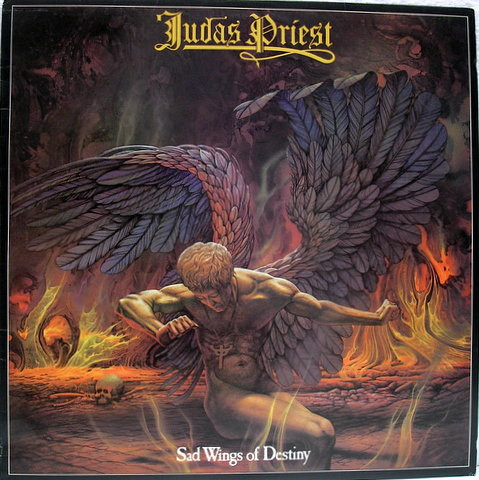„Epitaph“ is one of the most unique and emotionally striking songs from Judas Priest’s 1976 album Sad Wings of Destiny. Unlike the band’s signature heavy metal sound, this track leans towards a melancholic, theatrical ballad, heavily influenced by Queen-like vocal harmonies and a piano-driven composition. Lyrically, it stands as a somber reflection on aging, regret, and the inevitability of death, making it one of the most introspective and haunting songs in the band’s early catalog.
Overview
At its core, Epitaph explores:
- The sorrow of an old man looking back on his life, filled with missed opportunities and regret.
- A lament on loneliness and being forgotten, as the protagonist faces his final days.
- The universal fear of aging and irrelevance, making it a deeply human and relatable song.
- A theatrical and poetic farewell to life, resembling an actual epitaph carved into stone.
Musically, the song features dramatic piano melodies, layered choral vocals, and an absence of electric guitars, making it stand out in Judas Priest’s otherwise heavy and aggressive catalog.
Narrative Structure & Themes
1. Introduction: The Reflection of a Lonely Old Man
- The song immediately establishes its sorrowful tone:
“The old man sits there, crying / The tears are falling from his eyes”
- This opening line paints a tragic image—the protagonist is alone, weeping, overcome with emotion.
- Why is he crying? The song slowly reveals that it is the weight of his past decisions, regrets, and the realization that his time is nearly up.
- Themes: Isolation, sorrow, aging.
2. A Life Wasted (Verses & Middle Section)
- The old man reflects on his wasted potential and the emptiness of his existence:
“The years roll by so quickly now, the smiles soon turn to frowns”
- Time has slipped through his fingers, and the joy of youth has faded into a grim reality.
- Themes: The fleeting nature of time, disillusionment.
- He laments his unfulfilled dreams:
“He sees the truth so clearly now, but he’s running out of time”
- A powerful moment of realization—he finally understands what he should have done differently, but it’s too late to change anything.
- Themes: Regret, missed opportunities, the cruelty of hindsight.
3. The Weight of Loneliness (Chorus & Refrains)
- As the song progresses, it emphasizes the isolation of old age:
“And he cries, all his tears”
- The repetition of crying imagery highlights his utter loneliness—perhaps his loved ones are gone, or he has pushed them away over the years.
- Themes: Abandonment, the inevitability of being forgotten.
- The song echoes the pain of being left behind by life itself:
“All his dreams have vanished now / And what does he recall?”
- A heartbreaking moment—he looks back and sees nothing meaningful left.
- Themes: Emptiness, lost potential, existential dread.
4. The Final Farewell (Climactic Verse & Conclusion)
- The song closes with a sense of finality—the old man is nearing his inevitable end.
- There is no redemption, no escape, just the slow march toward death.
“So sad and lonely, wishing for the past”
- A desperate longing to relive his younger days, but knowing it’s impossible.
- The song fades out like a requiem, reinforcing the feeling that this is his last reflection before death.
- Themes: The passing of time, mortality, finality.
Themes & Symbolism
1. The Inescapability of Aging & Death
- The entire song serves as an epitaph—a poetic farewell carved in stone, marking the end of a lonely life.
- The protagonist is not a warrior or a rebel, but an everyday man facing the universal fate of all humans.
2. The Regret of a Wasted Life
- The song does not tell a story of triumph but rather one of loss and missed chances.
- Unlike other Judas Priest songs that celebrate freedom, power, or rebellion, Epitaph reminds listeners of the dangers of complacency and regret.
3. The Isolation of Old Age
- The old man seems completely alone, suggesting that he either outlived his loved ones or became isolated through his own actions.
- The song subtly hints at society’s neglect of the elderly, leaving them to fade away, unseen and unheard.
4. The Inevitability of Time’s Passage
- The lyrics frequently reference time slipping away, reinforcing the cruel nature of aging.
- No matter how much we want to go back, the past remains unreachable.
Musical & Emotional Impact
1. The Theatrical, Almost Operatic Delivery
- Unlike Judas Priest’s usual metal screams, Epitaph is sung in a softer, more mournful tone, heavily inspired by Queen’s layered vocal harmonies.
2. The Absence of Electric Guitars
- The lack of heavy riffs makes this song stand out dramatically on Sad Wings of Destiny, serving as a moment of sorrow amidst the album’s heavier material.
- The piano-based instrumentation enhances the song’s reflective, mournful quality.
3. The Haunting, Inevitable Fade-Out
- As the song reaches its conclusion, the music fades, much like the protagonist himself fading into obscurity.
- This musical choice reinforces the theme of disappearing without a trace, much like an unvisited tombstone.
Legacy & Influence
- Epitaph remains one of Judas Priest’s most unique and unexpected songs, standing apart from their usual aggressive style.
- The song’s themes of regret, loneliness, and mortality have resonated with listeners, making it one of the most emotionally heavy tracks in the band’s history.
- While the band never fully explored this style again, Epitaph paved the way for later introspective and melancholic moments in metal, influencing bands that balance power with vulnerability.
Final Verdict
„Epitaph“ is one of the most poignant and emotionally charged songs Judas Priest has ever written. Its melancholic tone, theatrical delivery, and haunting lyrics paint a vivid picture of loneliness, regret, and the inevitability of death. While it may not be the band’s heaviest song, it remains one of their most thought-provoking, serving as a cautionary tale about the passage of time and the cost of a life unlived.
A tragic, beautiful, and deeply human piece, Epitaph is a stark reminder that time waits for no one, and the past cannot be reclaimed.



